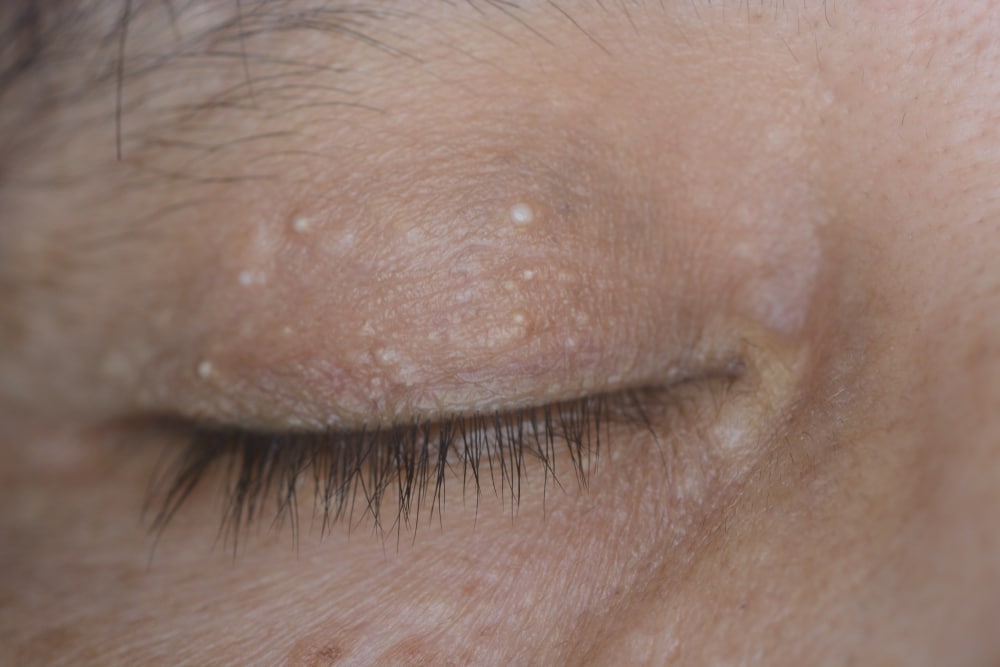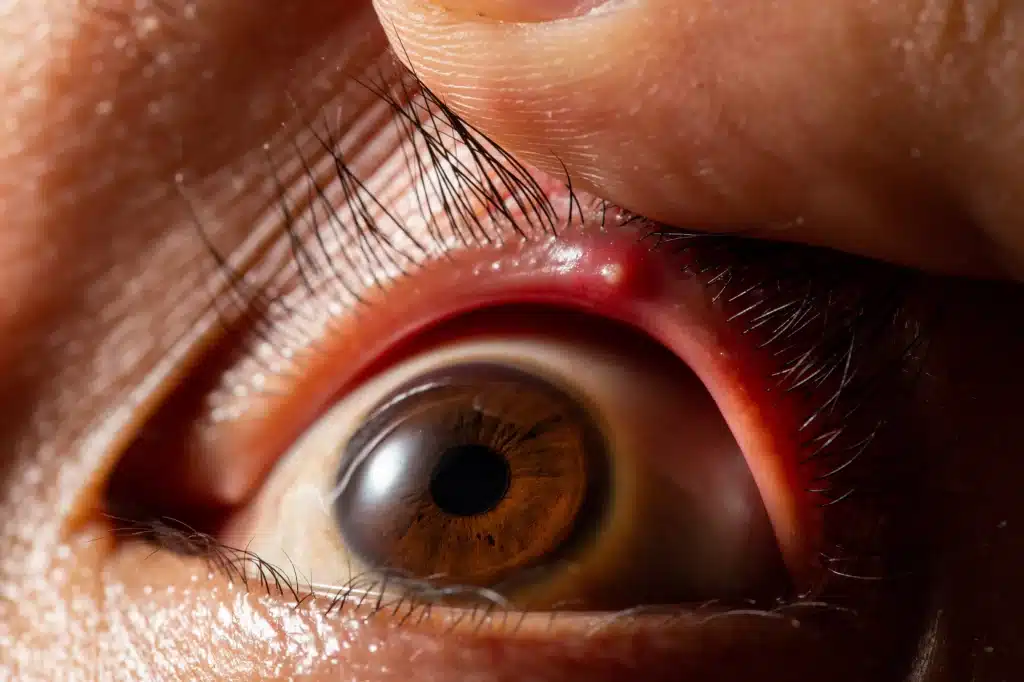Medically Reviewed by:
Do You Know How to Identify Eye Health Risks?
You can do many things to keep them healthy and make sure you’re seeing your best. Follow these simple guidelines for maintaining healthy eyes.
Diabetes – High blood sugar may cause the lens to swell, leading to distorted vision and can lead to diabetic retinopathy, a leading cause of blindness.
Obesity and High Blood Pressure – Being overweight or obese increases your risk of developing diabetes and other systemic conditions, which can lead to vision loss, such as diabetic eye disease or glaucoma.
Smoking – The risk of cataracts more than doubles for people who smoke and the risk of developing age-related macular degeneration (AMD) is three times higher.
Know your Family’s Eye Health History – Talk to your family members about their eye health history. It’s important to know if anyone has been diagnosed with an eye disease or condition since many are hereditary. FYI…a very strong genetic correlation exists with glaucoma.
Eat right to protect your sight – Eating a diet rich in fruits and vegetables—particularly dark leafy greens, such as spinach, kale, or collard greens—is important for keeping your eyes healthy. Research has also shown there are eye health benefits from eating fish high in omega-3 fatty acids, such as salmon, tuna, and halibut.
Prolonged Use of Corticosteroid Medications – the use of inhaled and oral steroids as well as eye drops containing steroids can accelerate the development of cataracts and contribute to glaucoma.
Drinking Excessive Amounts of Alcohol – chronic drinkers are at a higher risk for eye disorders.
Previous Eye Injury or Eye Surgery – this is the leading cause of cataracts in people under 40.
Wear Your Shades – When purchasing sunglasses, look for ones that block out 99 to 100 percent of both UV-A and UV-B radiation.
Give your eyes a rest. If you spend a lot of time at the computer or focusing on any one thing, you sometimes forget to blink and your eyes can get fatigued. Try the 20-20-20 rule: Every 20 minutes, look away about 20 feet in front of you for 20 seconds.
Our doctors, Dr. Mark L. Mayo, Dr. Edward Wade, Dr. Ting-Fang Suarez, and Dr. Paul Stewart recommend if any of these factors are creating vision problems, schedule a comprehensive dilated eye exam with your eye doctor.
Related Articles
Medically Reviewed by:
Eat Right For Your SIGHT!
Proper nutrition is critical to good eye health.
- Eat Lots of Vegetables and Fruits – Antioxidants protect against oxidation, which is a part of the process of macular degeneration (AMD). Dark green leafy vegetables like spinach, kale, mustard greens, and collard greens contain high levels of lutein, a critical antioxidant. Antioxidants are also present in fruits and vegetables with bright color, including red grapes, peppers, corn, oranges, cantaloupe, and mango. Look for fresh produce in a variety of colors to get a wide range of vitamins in your diet.
- Eat Fish – People who eat fish 2-3 times a week have a lower risk for AMD. Fish contain omega-3 which seems to be a critical nutrient for the heart and eyes. The best fish are either wild salmon or small fish like sardines. If you cannot tolerate fish or obtain it easily, an omega-3 supplement is another option.
- Limit Your Fat Intake – In reviewing studies on fat, researchers found that while the amount of fat consumed makes a difference, the real issue for AMD is the number of saturated fats a patient consumes. The biggest source of saturated fat is animal products – beef, lamb, pork, lard, butter, cream, whole milk, and high-fat cheese. Plant oils also have saturated fat, including coconut oil, cocoa butter, palm oil, and palm kernel oil. Read the labels on processed foods and baked goods, as they often have high amounts of saturated fats. Instead, consume healthy fats like olive oil or avocado.
In addition to eating right Dr. Mark Mayo, Dr. Edward Wade, Dr. Ting-Fang Suarez, and Dr. Paul Stewart suggest you follow the below to help prevent AMD:
- Don’t Smoke
- Exercise regularly, and maintain a healthy weight
- Keep your blood pressure and cholesterol under control
- Wear sunglasses outdoors to block UV that may cause eye damage
- Have regular eye exams.
Related Articles
Medically Reviewed by:
April is Women’s Eye Health Month
Did you know women are more likely to suffer from visual impairments like age-related macular degeneration, glaucoma, diabetic retinopathy, and cataracts than men? According to the National Eye Institute (NEI), out of the 3.6 million Americans over 40 who suffer from optical damage or injury (including blindness) 2.3 million are women.
For women age 40 and older it’s recommended that you have a dilated eye exam. It’s also important to have a dilated eye exam any time a change in vision is detected.
Other things you can do to help maintain good vision:
- Don’t Smoke– Smoking significantly increases the risk of complications with certain eye diseases, especially in women.
- Monitor your vision – Check it often, and check it one eye at a time. If you notice a change in your vision, please notify your eye doctor right away.
- Eat a well balanced diet – Eat leafy green vegetables, oily fish, and fruits. Vitamin C, vitamin E, beta carotene, lutein, zeaxanthin, zinc and omega-3 fatty acids are helpful in slowing down the progression of many eye diseases.
- Exercise – This will aid in maintaining a healthy weight and good cardiovascular health. Obesity, high blood pressure and high cholesterol can lead to specific vision complications.
- Control your diabetes – Uncontrolled diabetes can cause permanent damage to eye structures.
- Wear sunglasses
- Educate yourself – About the possibility of a family history of eye disease and about eye diseases associated with your general health issues.
Related Articles
Medically Reviewed by:
Happy New Year’s Eve – Remember These Champagne Safety Tips
New Year’s Eve Eye Safety Tips
New Year’s Eve is one of the worst times of the year for eye injuries. This fact is due to one tradition…the midnight champagne toast. Many people do not know how to correctly open a champagne bottle. When a bottle is opened improperly, the cork is expelled at a high velocity by the gas pressure in the bottle. A champagne cork can fly up to 50 miles per hour. If the cork accidentally strikes the eye, it can lead to serious injuries including internal hemorrhage, traumatic cataract, and torn or detached retinas. To avoid turning a happy celebration into a tragedy follow some very easy rules:
Chill your champagne! Warm champagne creates more pressure behind the cork.
Do not shake the bottle!
Use a towel when opening the bottle.
Point the bottle at a 45-degree angle away from yourself and from anyone else.
Following these few steps can help ensure a safe and happy holiday with no unexpected trips to the emergency room! From everyone at ECT we wish you a Happy New Year and look forward to serving your vision care needs in 2015!
Related Articles
Medically Reviewed by:
Quit Smoking…A GREAT New Year’s Resolution
Make a healthful resolution to be smoke free in the New Year by kicking the habit!
No butts about it; Smoking is harmful to almost every organ in your body, including your eyes.
Related Articles
Financing Options Available
Apply today to find a financing option that meets your needs.
Our Locations
Houston/Bellaire
6565 W. Loop S., Suite 650Bellaire, TX 77401
Medical Office:
713-797-1010
Medical Fax:
713-357-7276
LASIK/Near Vision:
Office: 713-395-1515
Fax: 713-357-7278
Pasadena
4415 Crenshaw RoadPasadena, TX 77504
Medical Office:
281-977-8800
Medical Fax:
281-977-8877
Sugar Land
15200 S.W. Freeway, Suite 130Sugar Land, TX 77478
Medical Office:
281-277-1010
Medical Fax:
281-277-4504
Clear Lake
455 E. Medical Center Blvd., Suite 110Webster, TX 77598
Medical Office:
281-332-1397
Medical Fax:
281-282-9152
Katy
Greenhouse Medical Plaza2051 Greenhouse Road, Suite 110
Houston, TX 77084
Medical Office:
346-547-7070
Medical Fax:
281-214-2971
The Woodlands/Conroe
100 Medical Center Blvd., Suite 118Conroe, TX 77304
Medical Office:
936-647-1610
Medical Fax:
936-647-1620


